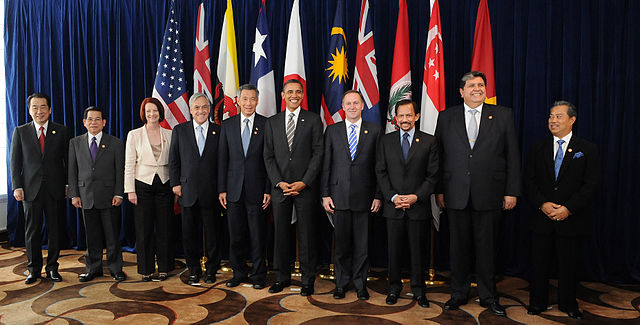
Leaders of TPP member states and prospective member states at a TPP summit in 2010. Photo by Gobierno de Chile, via Wikipedia.
By Pete Shaw
Congress is poised to abdicate both its constitutional and ethical responsibilities. On Thursday January 9th, Senate Democrat Max Baucus, Senate Republican Orrin Hatch, and Republican Representative Dave Camp introduced legislation that would grant President Obama “Fast Track” authority for the Trans-Pacific Partnership (TPP) Free Trade Agreement.
Although the Constitution grants Congress power over trade matters, Fast Track procedures–officially known as trade promotion authority–effectively transfers that authority to the President. Fast Track does not allow members of Congress to offer amendments to trade legislation, limiting their input to voting for it or against it. Debate would also be limited.
The push for Fast Track is seen by many opposed to so-called free trade agreements like NAFTA as a way to institute the TPP–an arrangement between the US and other Pacific Rim nations–before US citizens discover its contents. Considering that the TPP negotiations have largely been kept secret–even from members of Congress–and that what little the US public knows about those negotiations is due to Wikileaks, that assessment seems correct.
“These types of agreements stink so badly,” said David Delk of the Alliance for Democracy, “and engender so much popular opposition that the administration and leadership in Congress know that without ‘Fast Track Authority’ these agreements would be enacted with the greatest difficulty, if at all. But if you can keep the agreement text secret, limit the participation of citizens and congress, and only allow a Yes or No vote, the chances of passage greatly increase.”
Arthur Stamoulis of the Citizens Trade Campaign said, “Fast Track concentrates power to set the terms of trade agreements in the hands of the Office of the United States Trade Representative’s bureaucrats and their corporate advisors, while vastly reducing the power of the public and elected officials. Given that today’s ‘trade’ deals cover not only tariffs, but are a back-door means of affecting energy and the environment, financial regulations, government purchasing, immigration, food safety, food sovereignty, Internet protocols, access to medicine and more, who gets to write the rules is obviously a very big deal.”
Named the Bipartisan Trade Priorities Act of 2014, an accompanying one page press release titled “Baucus, Hatch, Camp Unveil Bill to Bring Home Job-Creating Trade Agreements” touted its merits, referring to job creation at least five times. However, free trade agreements have had little to do with creating jobs, but rather have been about creating profits for corporations and investors. Those profits, in fact, have come at the expense of workers. According to Public Citizen’s Lori Wallach, in its 20 years NAFTA has resulted in a net loss of 1 million US jobs, a far cry from the promised 200,000 created jobs per year. It has also caused a decrease in wages in tandem with an increase in inequality.
Yet despite all this evidence, the US government continues promoting trade agreements that destroy jobs and also result in decreased wages and benefits. The impact upon the people in other countries that sign on to the legislation–usually countries with weak labor and environmental laws–is often far worse.
Last November, Representatives Rosa DeLauro, Louise Slaughter, and George Miller spearheaded a letter signed by 151 Democrats in opposition to Congress giving up its constitutional authority over trade matters. “For too long, bad trade deals have allowed corporations to ship good American jobs overseas, and wages, benefits, workplace protections and quality of life have all declined as a result,” read their joint statement. “Our constituents did not send us to Washington to ship their jobs overseas, and Congress will not be a rubber stamp for another flawed trade deal that will hang the middle class out to dry. Instead of pursuing the same failed trade policies we should support American workers by making the necessary investments to compete in today’s global economy.”
Oregon’s Congressional Delegation had already expressed concerns over Fast Track legislation with Congressmen Kurt Schrader and Peter DeFazio joining three quarters of House Democrats who signed onto a letter drawn up by DeLauro and Miller that opposes Fast Track. Representatives Earl Blumenauer and Suzanne Bonamici also signed onto another letter signaling concerns over a renewal of Fast Track. “Together these letters demonstrated a strong demand from Oregon’s delegation for a trade negotiating process that would allow greater oversight than what Fast Track would allow,” said Elizabeth Swager from Oregon Fair Trade Campaign.
Signatures on letters, however, are not votes. If history is any guide, the vote will be tight. “The last Fast Track vote, in 2002, was decided by a two-vote margin.,” said Stamoulis. “The outcome of this year’s fight will be decided by a close margin, and as such, the position of Oregon’s Congressional delegation will play a major role in whether or not Fast Track for the TPP is defeated. People should be doing everything they can to make sure Reps. Blumenauer, Bonamici and Schrader know where constituents stand.”
For more information and to get involved in stopping Fast Track and the Trans Pacific Partnership, see the websites for the Citizens Trade Campaign (http://www.citizenstrade.org/ctc/), Public Citizen (https://www.citizen.org/TPP), and the Alliance for Democracy)http://www.afd-pdx.org/
To call your senators and representative, contact the Capitol Switchboard at: (202) 224-3121.






